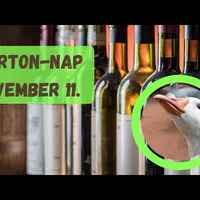Márton-nap, november 11.
Martin||November
||noviembre
Martinstag, 11. November
Martin's Day, 11 novembre
Giorno di Martin, 11 novembre
11月11日マーティンズ・デイ
Martinusdag, 11 november
Dia de São Martinho, 11 de novembro
День Мартина, 11 ноября
Martinsdagen den 11 november
День Мартіна, 11 листопада
11 月 11 日,马丁节。
Martin's Day, November 11.
Día de Martín, 11 de noviembre.
November 11-én, szerdán, volt Márton-nap.
November|on the 11th|Wednesday|was||
Noviembre|el 11|miércoles|fue||
On November 11, Wednesday, it was Martin's Day.
El 11 de noviembre, miércoles, fue el Día de Martín.
Ez Szent Márton ünnepe, aki Magyarország területén született
This|Saint|Martin|celebration|who|Hungary|on the territory|was born
Este|Santo|Martín|celebración|quien|Hungría|en el territorio|nació
This is the feast of Saint Martin, who was born in the territory of Hungary.
Es la festividad de San Martín, que nació en el territorio de Hungría.
Persze, akkor még nem Magyarország volt,,
Of course|then|still|not|Hungary|was
Claro|entonces|aún|no|Hungría|era
Of course, back then it was not Hungary,
Por supuesto, entonces no era Hungría.
és nem voltak itt magyarok.
and|not|were|here|Hungarians
y|no|había|aquí|húngaros
and there were no Hungarians here.
y no había húngaros aquí.
hanem a rómaiak voltak itt, és úgy hívták az országot, a területet, hogy Pannónia.
but|the|Romans|were|here|and|so|they called|the|country|the|territory|that|Pannonia
sino|los|romanos|estaban|aquí|y|así|llamaban|el|país|el|territorio|que|Panonia
but it was the Romans who were here, and they called the country, the area, Pannonia.
sino que estaban los romanos aquí, y llamaron al país, al territorio, Pannonia.
És nagyon sok szokás kapcsolódik a Márton-naphoz.
And|very|many|customs|are related|to the||to the day
Y|muy|muchas|costumbres|están relacionadas|al||
And many customs are associated with Martin's Day.
Y hay muchas costumbres relacionadas con el día de San Martín.
Ugye, mi magyarok nagyon szeretünk enni és inni,
right|we|Hungarians|very|love|to eat|and|to drink
¿verdad|yo|húngaros|muy|amamos|comer|y|beber
You know, we Hungarians really love to eat and drink,
¿Verdad que nosotros, los húngaros, amamos comer y beber mucho,
és természetesen ezen a napon is eszünk és iszunk sokat.
and|of course|on this|the|day|also|we eat|and|we drink|a lot
y|por supuesto|en este|el|día|también|comemos|y|bebemos|mucho
and of course, on this day we also eat and drink a lot.
y, por supuesto, en este día también comemos y bebemos mucho.
És van egy mondás:
And|there is|a|saying
Y|hay|un|dicho
And there is a saying:
Y hay un dicho:
Aki Márton napján libát nem eszik, az egész évben éhezik.
He who|Martin|on the day of|goose|not|eats|he|whole|year|will be hungry
Quien|Martín|en el día|ganso|no|come|él|todo|año|pasa hambre
Whoever does not eat goose on Martin's Day will be hungry all year.
Quien no come ganso en el día de Martín, pasará hambre todo el año.
Vagyis, ha november 11-én nem eszünk libát, akkor egész évben éhesek leszünk.
That is|if|November|on 11th|not|we eat|goose|then|whole|year|hungry|we will be
Es decir|si|noviembre|el 11|no|comemos|ganso|entonces|todo|año|hambrientos|estaremos
In other words, if we do not eat goose on November 11, we will be hungry all year.
Es decir, si no comemos ganso el 11 de noviembre, estaremos hambrientos todo el año.
És persze, a Márton-naphoz közel, a hétvégéken
And|of course|the|||close|the|on weekends
Y|por supuesto|al|||cerca|en|los fines de semana
And of course, close to Martin's Day, on the weekends
Y por supuesto, cerca del día de Martín, los fines de semana
mindig nagyon sok városban van libafesztivál.
always|very|many|in the city|there is|goose festival
siempre|muy|muchos|en la ciudad|hay|festival de la ganso
there are always many goose festivals in various cities.
siempre hay muchos festivales de ganso en varias ciudades.
És a másik fontos dolog, hogy november 11-én, Márton napján
And|the|other|important|thing|that|November|on 11th|Martin|day
Y|la|otra|importante|cosa|que|noviembre|11|Martín|día
And the other important thing is that on November 11, on Martin's Day
Y la otra cosa importante es que el 11 de noviembre, en el día de Martín
lehet először megkóstolni az újborokat.
it is possible|first|to taste|the|new wines
se puede|primero|probar|los|vinos nuevos
you can taste the new wines for the first time.
se pueden probar por primera vez los vinos nuevos.
Az újbor az a friss bor, amit az idei szőlőből készítettek,
The|new wine|is|the|fresh|wine|that|the|this year's|from grapes|made
El|vino nuevo|es|el|fresco|vino|que|el|de este año|de uva|hicieron
The new wine is the fresh wine made from this year's grapes,
El vino nuevo es el vino fresco que se ha elaborado con las uvas de este año,
és ez a bor általában november közepén már készen van,
and|this|the|wine|usually|November|in mid|already|ready|is
y|esto|el|vino|generalmente|noviembre|a mediados de|ya|listo|está
and this wine is usually ready by mid-November,
y este vino generalmente está listo a mediados de noviembre,
és meg lehet kóstolni.
and|again|can|taste
y|de nuevo|se puede|probar
and it can be tasted.
y se puede degustar.
és természetesen sok városban van újborfesztivál is.
and|of course|many|in the cities|there is|new wine festival|also
y|por supuesto|muchas|en la ciudad|hay|festival de vino nuevo|también
and of course, there are new wine festivals in many cities.
Y, por supuesto, hay festivales de vino nuevo en muchas ciudades.
Sajnos november 11-e már elmúlt,
Unfortunately|November|11th|already|has passed
Desafortunadamente|noviembre|11|ya|pasado
Unfortunately, November 11th has already passed,
Desafortunadamente, el 11 de noviembre ya ha pasado,
de Márton-napon mindig egyél libát, és igyál egy kicsi újbort is, ha teheted. Szia!
but|||always|eat|goose|and|drink|a|little|new wine|also|if|you can|Hi
en|||siempre|come|ganso|y|bebe|un|pequeño|vino nuevo|también|si|puedes|¡Hola
but on Martin's Day, always eat goose and drink a little new wine, if you can. Bye!
pero en el día de San Martín siempre come ganso y bebe un poco de vino nuevo, si puedes. ¡Hola!
SENT_CWT:AFkKFwvL=3.19 PAR_TRANS:gpt-4o-mini=1.92 SENT_CWT:AFkKFwvL=2.63 PAR_TRANS:gpt-4o-mini=1.59
en:AFkKFwvL es:AFkKFwvL
openai.2025-02-07
ai_request(all=28 err=0.00%) translation(all=22 err=0.00%) cwt(all=175 err=5.71%)

